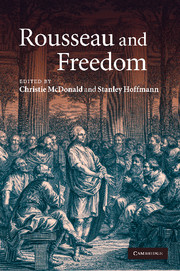Book contents
- Frontmatter
- Contents
- List of illustrations
- Notes on contributors
- Acknowledgments
- List of abbreviations
- Introduction
- PART I
- 1 Freeing man from sin: Rousseau on the natural condition of mankind
- 2 Making history natural in Rousseau's Discourse on the Origins of Inequality
- 3 Rousseau's Second Discourse: between Epicureanism and Stoicism
- 4 Jean-Jacques Rousseau and Diderot in the late 1740s: satire, friendship, and freedom
- 5 If you please! Theater, verisimilitude, and freedom in the Letter to d'Alembert
- 6 Music, the passions, and political freedom in Rousseau
- PART II
- PART III
- Bibliography
- Index
4 - Jean-Jacques Rousseau and Diderot in the late 1740s: satire, friendship, and freedom
Published online by Cambridge University Press: 05 May 2010
- Frontmatter
- Contents
- List of illustrations
- Notes on contributors
- Acknowledgments
- List of abbreviations
- Introduction
- PART I
- 1 Freeing man from sin: Rousseau on the natural condition of mankind
- 2 Making history natural in Rousseau's Discourse on the Origins of Inequality
- 3 Rousseau's Second Discourse: between Epicureanism and Stoicism
- 4 Jean-Jacques Rousseau and Diderot in the late 1740s: satire, friendship, and freedom
- 5 If you please! Theater, verisimilitude, and freedom in the Letter to d'Alembert
- 6 Music, the passions, and political freedom in Rousseau
- PART II
- PART III
- Bibliography
- Index
Summary
On the Origin of Inequality (1755), Rousseau's second discourse, implies by its very title that inequality has a beginning. The argument of the discourse will refuse to naturalize inequality by putting it in an eternal present: it had an origin in time. Hence, physical inequality (some are stronger, taller, cleverer …) cannot explain, still less justify, political or economic subordination or even sociopolitical differentiation. These physical differences take on meaning only if society is already there in which they are meaningful and useful. The implications of this point were well understood in Rousseau's time by some hostile contemporary commentators, who said that the Discourse was a denaturalization, and hence a putting in doubt, of the whole basis of social inequality, the “inégalité des conditions” (the inequality of conditions). In the narrative of the Second Discourse, social inequality develops out of dependence, and this is possible only if society preexists, if it has already begun. Some of the most eloquent pages of the Discourse describe the gradual development of society and the gradual installation of an all-encompassing network of relations and thus interdependency. He who is dependent is not free: she is trapped in, or can only work with, a historically derived system of social and economic relations.
The dependency woven by social relations entails obligations. Rousseau's resistance to obligation, his supersensitivity to the semiconscious subtext that there is in everyday conversational interchange, his habit of overinterpreting – which develops into the paranoia legible, for instance, in the “Letter to M. de Saint-Germain (1770) – these do not mean that Rousseau was entirely wrong about his friends and protectors.
- Type
- Chapter
- Information
- Rousseau and Freedom , pp. 58 - 76Publisher: Cambridge University PressPrint publication year: 2010
- 3
- Cited by

